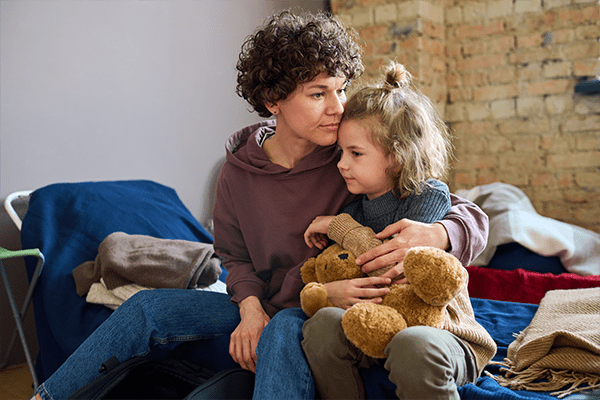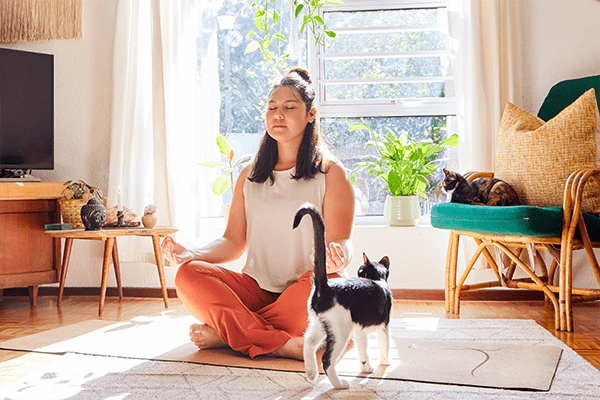Protecting Your Mental Health: Tips for Co-Parents
5 tips to help co-parents protect their mental health.
- 3.5 min read
- health & wellness

Protecting your mental health is essential at any stage in life, no matter your circumstances. For co-parents specifically, having shared custody of your children can come with unique challenges, which can have adverse effects on your overall health and wellness. Whether you have an amicable or high-conflict relationship with your child’s mother or father, difficult situations may come up, and that can impact your mental state.
Signs of declining mental health
Deterioration of your mental wellness should not be taken lightly. As a parent, it’s crucial to recognize the signs early so you can take the appropriate steps. Initial warning signs include:
- Disrupted sleep
- Irritability or being more emotional than usual
- Loss of joy
- Change in appetite
- Worsening physical symptoms
- Low energy
Some of the more serious symptoms include constant feelings of depression, feeling disconnected from reality, or isolating yourself from friends and family. If you start noticing prolonged bouts of any of these symptoms without relief, consider speaking with a loved one or going to counseling to get the help you need.

5 tips to protect your mental health when co-parenting
Whether your co-parenting situation is new or old, these five tips can be extremely helpful for moms and dads navigating joint custody.
1. Set boundaries
Personal boundaries should be a standard part of every relationship, and they’re especially important for those with an ex-partner or spouse. However, it doesn’t matter whether you and your co-parent are divorced, broken up, or were never even together—boundaries can help protect your mental health.
“Setting healthy boundaries in co-parenting is a way to respect both parents’ time, energy, and privacy while they work together to cooperatively raise their children,” says Certified Divorce Transition & Recovery Coach, Tessa Noel. "Once the boundary is set, it will become a normal, everyday part of the co-parenting relationship that eliminates resentment and nurtures compassion.”
Boundaries look different for every relationship, and that’s okay. The important thing is evaluating what those need to look like in your situation to keep your health and your child’s health at the forefront. Learn more about setting healthy co-parenting boundaries.
2. Maintain realistic expectations
Something that often takes a toll on the mental health of parents with a narcissistic or high-conflict co-parent is feeling repeatedly blindsided when expectations aren’t met. Your expectations may not even be high—they could be something as simple as expecting your co-parent to follow the schedule set forth by the parenting plan—but the feeling of being unprepared when something goes wrong can be debilitating.
“It’s never pleasant to have to prepare for disappointment, especially your children’s disappointment,” says Clinical Psychologist & Narcissism Expert, Dr. Ramani Durvasula. "Having realistic expectations means installing plan B, C, and D in place, so you are ready and can protect your children when your co-parent does it again. This not only protects your children, but helps you feel more prepared and in control.”
Setting realistic expectations for co-parenting is crucial to planning and preparing for unideal circumstances, which helps protect your and your child’s mental state. Learn more from Dr. Ramani.

3. Focus on your children
Juggling everyday parenting responsibilities with the added stress that shared custody can bring is often overwhelming. To protect your mental health, it’s important to focus on what it’s all for—your kids. This can help you keep a positive mindset throughout your co-parenting struggles and stresses. The health benefits of positive thinking include:
- Lower rates of depression
- Lower levels of distress and pain
- Better psychological and physical well-being
- Better coping skills during hardships and times of stress
Beyond focusing on your children, there are many ways to turn negative thoughts into positive actions. Try this advice.
4. Keep a journal
Journaling is known to reduce depression, stress, and anxiety. It can help improve your mental health by:
- Helping you prioritize problems, fears, and concerns.
- Tracking any symptoms day-to-day so you can recognize triggers and learn ways to better control them.
- Providing an opportunity for positive self-talk and identifying negative thoughts and behaviors.
TalkingParents offers the Personal Journal, giving you a private place to take notes right from within your co-parenting communication platform. The feature can be used to journal strictly about your co-parenting situation, or you can use it to manage thoughts and emotions related to any part of your life. Co-Parenting Coach and single father, Jay Skibbens, shares ways to overcome triggers in co-parenting through journaling in this article.

5. Practice self-care
Whether you’re a co-parent or not, self-care is so important to protect your mental health. Here are some tips to improve your mental wellbeing:
- Exercise regularly
- Eat regular, healthy meals
- Stay hydrated
- Make time for relaxing activities
- Stay connected with those who uplift you
- Make sleep a priority
- Practice gratitude
Taking time to rest, relax, and focus on yourself and what makes you feel good can do wonders for your health and wellness. Continue to make your mental health a top priority, and don’t be afraid to get help if you’re struggling. For more information, check out more mental health resources for parents.